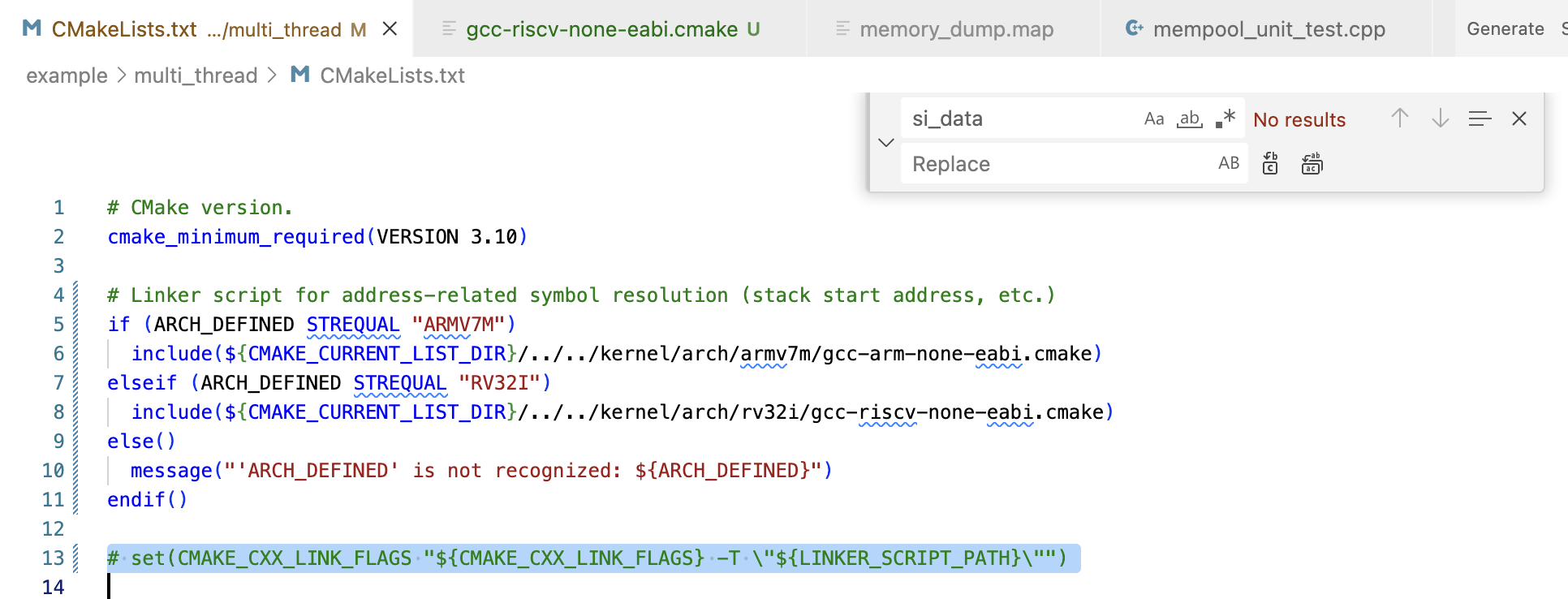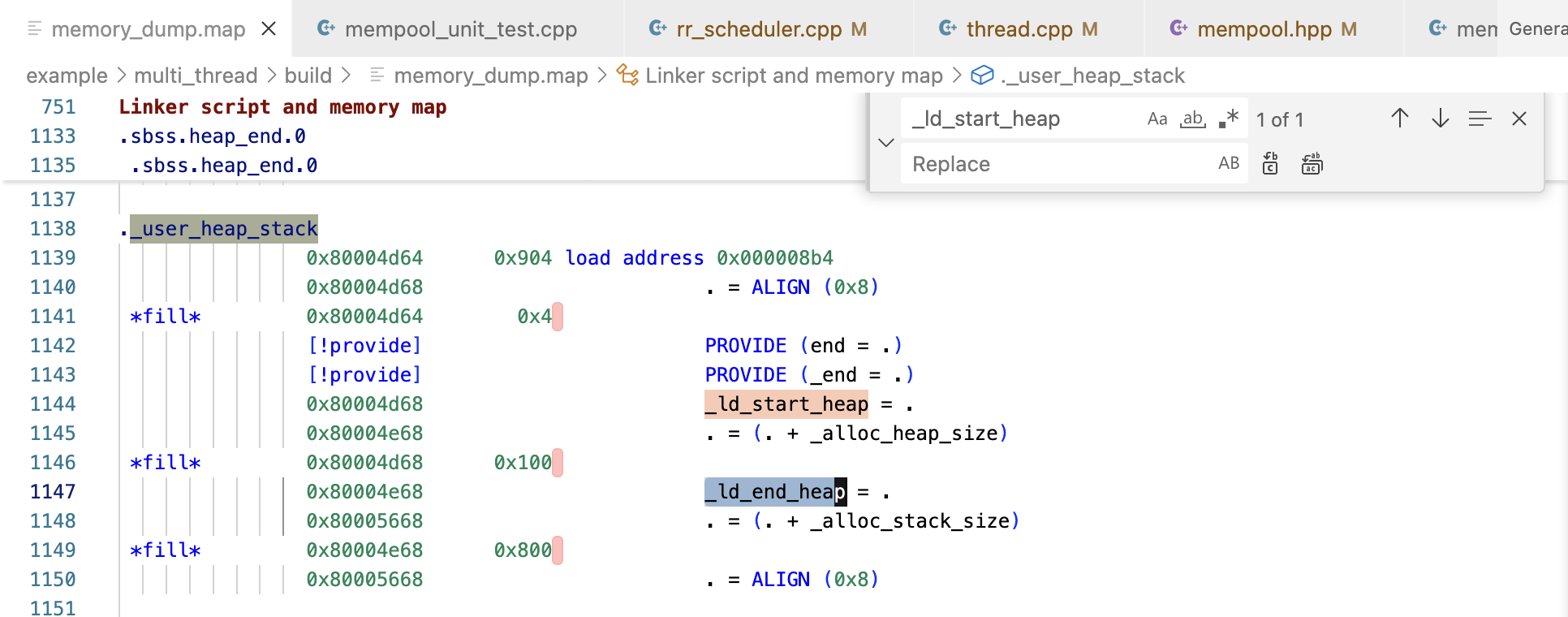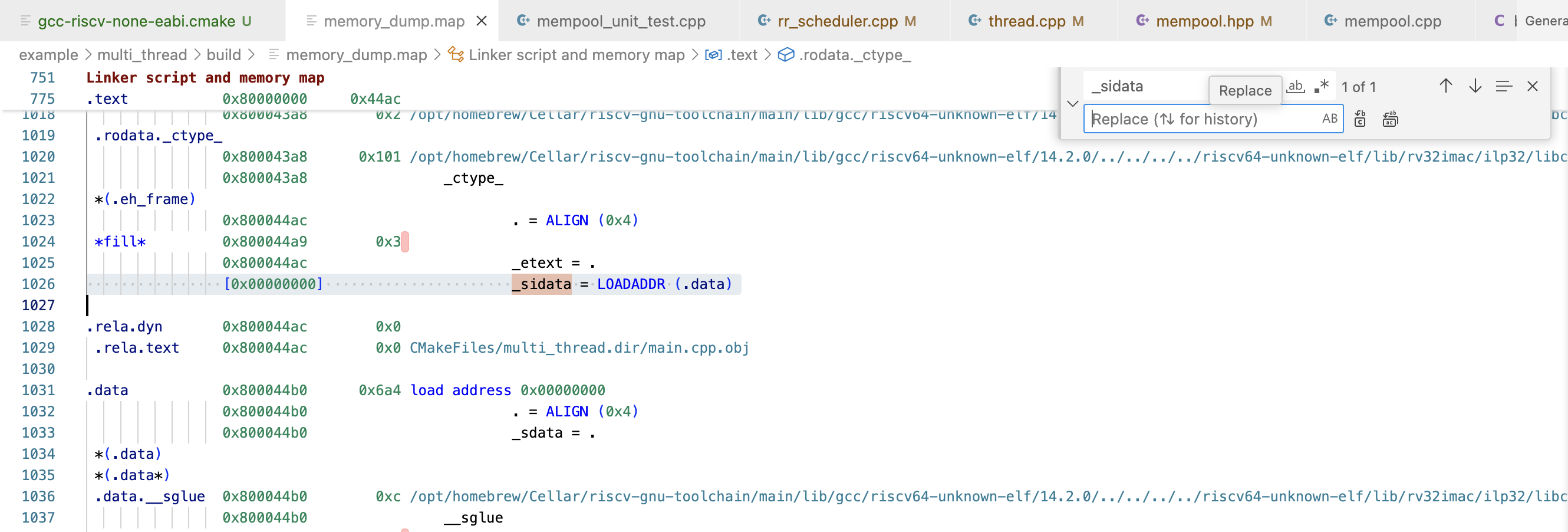Recently I have ported a project and enabled cross-compilation for 32 bit RISC-V ISA.
There have been several issues during the process that I wish to highlight.
The compilation is on MacOS Sequoia 15.5, and target platform is RV32IM emulated using QEMU.
brew install riscv-software-src/riscv/riscv-gnu-toolchain
brew install qemu
Even though the name suggests a 64-bit executable, the toolchain allows you to specify the machine word size to generate a 32-bit binary.
The following binary utilities will be used for compilation and inspection:
riscv64-unknown-elf-gcc
riscv64-unknown-elf-g++
riscv64-unknown-elf-nm
riscv64-unknown-elf-objdump
I created gcc-riscv-none-eabi.cmake to contain all the reusable macros specific to RISC-V compilation.
It could be included by other CMakeLists.txt files to centralize configuration, reduce redundancy, and ensure consistent toolchain behavior across modules.
# This cmake module: cross compilation configuration to compile for RISCV32I (target platform) on MACOS (host).
# Avoids recursive inclusion.
include_guard(GLOBAL)
# Specify a generic embedded target system and RISCV architecture for cross-compilation.
set(CMAKE_SYSTEM_NAME Generic)
set(CMAKE_SYSTEM_PROCESSOR "riscv32")
# Force CMake to treat specified compilers as valid GNU C/C++ compilers without detection.
set(CMAKE_C_COMPILER_FORCED TRUE)
set(CMAKE_CXX_COMPILER_FORCED TRUE)
set(CMAKE_C_COMPILER_ID GNU)
set(CMAKE_CXX_COMPILER_ID GNU)
# Ensure the toolchain is installed via Homebrew on macOS if not already found.
find_program(RISCV_GCC riscv64-unknown-elf-gcc)
if(NOT RISCV_GCC)
message(STATUS "riscv64-unknown-elf-gcc not found. Attempting to install via Homebrew...")
execute_process(
COMMAND brew install riscv-tools
RESULT_VARIABLE BREW_RESULT
)
if(NOT BREW_RESULT EQUAL 0)
message(FATAL_ERROR "Failed to install riscv-tools using Homebrew.")
endif()
else()
message(STATUS "Found arm-none-eabi-gcc: ${RISCV_GCC}")
endif()
# Define tool chain path.
set(TOOLCHAIN_PATH_MACOS /opt/homebrew/bin)
set(TOOLCHAIN_PREFIX ${TOOLCHAIN_PATH_MACOS}/riscv64-unknown-elf-)
set(CMAKE_C_COMPILER ${TOOLCHAIN_PREFIX}gcc)
set(CMAKE_ASM_COMPILER ${CMAKE_C_COMPILER})
set(CMAKE_CXX_COMPILER ${TOOLCHAIN_PREFIX}g++)
set(CMAKE_LINKER ${TOOLCHAIN_PREFIX}g++)
set(CMAKE_OBJCOPY ${TOOLCHAIN_PREFIX}objcopy)
set(CMAKE_SIZE ${TOOLCHAIN_PREFIX}size)
# Set output executable suffix to .elf for ASM, C, and C++ targets.
set(CMAKE_EXECUTABLE_SUFFIX_ASM ".elf")
set(CMAKE_EXECUTABLE_SUFFIX_C ".elf")
set(CMAKE_EXECUTABLE_SUFFIX_CXX ".elf")
set(CMAKE_TRY_COMPILE_TARGET_TYPE STATIC_LIBRARY)
# target specific flags.
set(TARGET_FLAGS "-march=rv32imac -mabi=ilp32")
set(LINKER_SCRIPT_PATH ${CMAKE_CURRENT_LIST_DIR})
set(CMAKE_C_FLAGS "${CMAKE_C_FLAGS} ${TARGET_FLAGS}")
# Enable additional C compiler warnings (-Wall, -Wextra, -Wpedantic) and optimize code by placing data and functions in separate sections (-fdata-sections, -ffunction-sections) for better linker garbage collection.
set(CMAKE_C_FLAGS "${CMAKE_C_FLAGS} -Wall -Wextra -Wpedantic -fdata-sections -ffunction-sections")
# Set different optimization and debug flags based on build type: Debug (-O0, -g3) and Release (-Os, -g0).
if(CMAKE_BUILD_TYPE MATCHES Debug)
set(CMAKE_C_FLAGS "${CMAKE_C_FLAGS} -O0 -g3")
endif()
if(CMAKE_BUILD_TYPE MATCHES Release)
set(CMAKE_C_FLAGS "${CMAKE_C_FLAGS} -Os -g0")
endif()
# Set assembler flags to enable preprocessor, generate dependency files (-MMD, -MP) for ASM files.
set(CMAKE_ASM_FLAGS "${CMAKE_C_FLAGS} -x assembler-with-cpp -MMD -MP")
# Set C++ compiler flags to disable RTTI, exceptions, and thread-safe statics for reduced binary size and performance in embedded systems.
set(CMAKE_CXX_FLAGS "${CMAKE_C_FLAGS} -fno-rtti -fno-exceptions -fno-threadsafe-statics")
set(CMAKE_C_LINK_FLAGS "${TARGET_FLAGS}")
set(CMAKE_C_LINK_FLAGS "${CMAKE_C_LINK_FLAGS} -T \"${LINKER_SCRIPT_PATH}/riscv_qemu_virt.ld\"")
set(CMAKE_C_LINK_FLAGS "${CMAKE_C_LINK_FLAGS} -Wl,-Map=${CMAKE_PROJECT_NAME}.map -Wl,--gc-sections")
set(CMAKE_C_LINK_FLAGS "${CMAKE_C_LINK_FLAGS} -Wl,--start-group -lc -lm -Wl,--end-group")
set(CMAKE_C_LINK_FLAGS "${CMAKE_C_LINK_FLAGS} -Wl,--print-memory-usage")
set(CMAKE_CXX_LINK_FLAGS "${CMAKE_C_LINK_FLAGS} -Wl,--start-group -lstdc++ -lsupc++ -Wl,--end-group")
-march=rv32im: machine architecture as risc-v 32 bit and extensions (i: integer, m: mul/div)
-mabi=ilp32: machine abstraction binary interface as 32-bit int, long, and pointer — required to match libraries/toolchain
-T \"${LINKER_SCRIPT_PATH}/riscv_qemu_virt.ld\": specify a custom linker script
In CMakeLists.txt, include above cmake script conditionally by ARCH_DEFINED passed by user in cmake command.
...
if (ARCH_DEFINED STREQUAL "ARMV7M")
include(${CMAKE_CURRENT_LIST_DIR}/../../kernel/arch/armv7m/gcc-arm-none-eabi.cmake)
set(LINKER_SCRIPT_PATH ${CMAKE_CURRENT_LIST_DIR}/../../kernel/arch/armv7m/STM32F767ZITx_FLASH.ld)
elseif (ARCH_DEFINED STREQUAL "RV32I")
include(${CMAKE_CURRENT_LIST_DIR}/../../kernel/arch/rv32i/gcc-riscv-none-eabi.cmake)
set(LINKER_SCRIPT_PATH ${CMAKE_CURRENT_LIST_DIR}/../../kernel/arch/rv32i/riscv_qemu_virt.ld)
else()
message("'ARCH_DEFINED' is not recognized: ${ARCH_DEFINED}")
endif()
...
The target architecture is passed to CMake:
cmake .. -DARCH_DEFINED=RV32I -DCMAKE_EXPORT_COMPILE_COMMANDS=ON
make -j12
/opt/homebrew/Cellar/riscv-gnu-toolchain/main/lib/gcc/riscv64-unknown-elf/14.2.0/../../../../riscv64-unknown-elf/bin/ld:/Users/lhan/Projects/YesRTOS/example/multi_thread/../../kernel/arch/rv32i/riscv_qemu_virt.ld:7:
warning: redeclaration of memory region `RAM'
/opt/homebrew/Cellar/riscv-gnu-toolchain/main/lib/gcc/riscv64-unknown-elf/14.2.0/../../../../riscv64-unknown-elf/bin/ld:/Users/lhan/Projects/YesRTOS/example/multi_thread/../../kernel/arch/rv32i/riscv_qemu_virt.ld:8:
warning: redeclaration of memory region `FLASH'
Unexpected warning despite RAM and FLASH being defined only once in the linker script.
Strategy: Enabling verbose mode in linker. I added below flag to CMAKE_C_LINK_FLAGS.
...
# -Wl specifies verbose for linker.
set(CMAKE_CXX_LINK_FLAGS "${CMAKE_C_LINK_FLAGS} -Wl,--verbose")
...
...
[ 81%] Built target LibYesRTOSKernel
[ 90%] Building CXX object CMakeFiles/multi_thread.dir/main.cpp.obj
[100%] Linking CXX executable multi_thread.elf
GNU ld (GNU Binutils) 2.43.1
Supported emulations:
elf64lriscv
elf32lriscv
elf64briscv
elf32briscv
opened script file /Users/lhan/Projects/YesRTOS/kernel/arch/rv32i/riscv_qemu_virt.ld
opened script file /Users/lhan/Projects/YesRTOS/example/multi_thread/../../kernel/arch/rv32i/riscv_qemu_virt.ld
/opt/homebrew/Cellar/riscv-gnu-toolchain/main/lib/gcc/riscv64-unknown-elf/14.2.0/../../../../riscv64-unknown-elf/bin/ld:/Users/lhan/Projects/YesRTOS/example/multi_thread/../../kernel/arch/rv32i/riscv_qemu_virt.ld:7: warning: redeclaration of memory region `RAM'
/opt/homebrew/Cellar/riscv-gnu-toolchain/main/lib/gcc/riscv64-unknown-elf/14.2.0/../../../../riscv64-unknown-elf/bin/ld:/Users/lhan/Projects/YesRTOS/example/multi_thread/../../kernel/arch/rv32i/riscv_qemu_virt.ld:8: warning: redeclaration of memory region `FLASH'
using external linker script: /Users/lhan/Projects/YesRTOS/example/multi_thread/../../kernel/arch/rv32i/riscv_qemu_virt.ld
The linker messages show that riscv_qemu_virt.ld is opened twice at two different level of the project.

Solution: removing duplicate -T switch added to the compilation command due to mistake.
qemu-system-riscv32 -machine virt -bios multi_thread.elf -nographic -gdb tcp::1234 -s
From https://github.com/qemu/qemu/blob/master/hw/riscv/virt.c#L78-L99, 0x80000000 address is the location where the first instruction is to be executed.
In the linker script, same start address is mapped to contain .text, .data, .rodata, etc.
qemu-system-riscv32: Some ROM regions are overlapping
These ROM regions might have been loaded by direct user request or by default.
They could be BIOS/firmware images, a guest kernel, initrd or some other file loaded into guest memory.
Check whether you intended to load all this guest code, and whether it has been built to load to the correct addresses.
The following two regions overlap (in the memory address space):
multi_thread.elf ELF program header segment 1 (addresses 0x0000000000000000 - 0x0000000000004238)
mrom.reset (addresses 0x0000000000001000 - 0x0000000000001028)
From the error message, it looks like there's object allocated to address segment in range 0x0000000000000000 - 0x0000000000004238.
However, in the linker script, I have allocate everything to 0x80000000.
The question is what is being added to this clashed segment?
OUTPUT_ARCH("riscv")
ENTRY(_start)
/* Memory layout */
MEMORY
{
/* FLASH (xrw) : ORIGIN = 0x20000000, LENGTH = 10K */
FLASH (wrx) : ORIGIN = 0x80000000, LENGTH = 128K
}
/* Stack and heap configuration */
_estack = ORIGIN(FLASH) + LENGTH(FLASH); /* End of FLASH */
_alloc_heap_size = 0x100; /* 8KB heap */
_alloc_stack_size = 0x800; /* No reserved stack (can be handled in startup) */
/* Sections layout */
SECTIONS
{
/* Code */
.text :
{
. = ALIGN(4);
KEEP(*(.init)) KEEP(*(.fini))
*(.text) *(.text*)
*(.rodata) *(.rodata*)
*(.eh_frame)
. = ALIGN(4);
_etext = .;
} > FLASH
/* Initialized data section in FLASH (copied from FLASH at runtime) */
.data :
{
. = ALIGN(4);
_sdata = .;
*(.data) *(.data*)
. = ALIGN(4);
_edata = .;
} > FLASH
/* Uninitialized data (zero-initialized) */
.bss :
{
. = ALIGN(4);
_sbss = .; __bss_start = _sbss;
*(.bss) *(.bss*) *(COMMON)
. = ALIGN(4);
_ebss = .; __bss_end__ = _ebss;
} > FLASH
/* Heap and optional stack region */
._user_heap_stack :
{
. = ALIGN(8);
PROVIDE(end = .);
PROVIDE(_end = .);
_ld_start_heap = .;
. = . + _alloc_heap_size;
_ld_end_heap = .;
. = . + _alloc_stack_size;
. = ALIGN(8);
} > FLASH
/* Strip unused standard library code (optional in embedded) */
/DISCARD/ :
{
*(.comment)
*(.note*)
*(.eh_frame_hdr)
*(.gcc_except_table)
*(.riscv.attributes)
}
}
riscv64-unknown-elf-nm -n multi_thread.elf
This prints the name map between symbols name to addresses, sorted.
In a symbol name map, A means an absolute symbol, T is a function in the text (code) section, B is an uninitialized global in the BSS section, and b is an uninitialized local symbol in BSS.
00000000 A _sidata
00000100 A _alloc_heap_size
00000800 A _alloc_stack_size
80000000 T _Z15thread0_routinev
8000000a T _Z15thread1_routinev
80000014 T _Z15thread2_routinev
8000001e T _Z15thread3_routinev
80000028 T main
800000d2 T _ZN7YesRTOS20PreemptFIFOScheduler4initEv
8000014e T _ZN7YesRTOS20PreemptFIFOScheduler10add_threadEPNS_6ThreadEj
8000019e T _ZN7YesRTOS20PreemptFIFOScheduler5startEv
80000242 T _ZN7YesRTOS20PreemptFIFOScheduler13schedule_nextEv
...
80004d50 B errno
80004d54 B __malloc_max_total_mem
80004d58 B __malloc_max_sbrked_mem
80004d5c B __malloc_top_pad
80004d60 b heap_end.0
80004d68 B _ld_start_heap
80004e68 B _ld_end_heap
80020000 T _estack
All _si_data, _alloc_heap_size, and _alloc_stack_size are Absolute addresses with value belonging to the clash region.
00000000 A _sidata
00000100 A _alloc_heap_size
00000800 A _alloc_stack_size
Strategy: Dump .map file to further investigate memory layout.

Both _ld_start_heap and _ld_end_heap are part of the ._user_heap_stack memory, addresses 0x80004d68 and 0x80004e68 are after 0x80000000 as expected.

However, the _sidata resides on address 0x00000000, in the clash region.
The _sidata = LOADADDR(.data) syntax comes from the linker script I have implemented.
The root cause is that _sidata in the linker script tries to retrieve the address of .data before .data is declared — a classic forward reference error in linker scripts.
...
_sidata = LOADADDR(.data);
.data : AT(_sidata)
{
. = ALIGN(4);
_sdata = .;
*(.data) *(.data*)
. = ALIGN(4);
_edata = .;
} > FLASH
...
Solution: _sidata is removed from linker script, or it could be declared within .data section.
gdb multi_thread.elf
target remote localhost:1234
b _start
b main
lhan@Mac build % gdb multi_thread.elf
GNU gdb (GDB) 16.3
Copyright (C) 2024 Free Software Foundation, Inc.
License GPLv3+: GNU GPL version 3 or later
This is free software: you are free to change and redistribute it.
There is NO WARRANTY, to the extent permitted by law.
Type "show copying" and "show warranty" for details.
This GDB was configured as "--host=aarch64-apple-darwin24.4.0 --target=x86_64-apple-darwin20".
Type "show configuration" for configuration details.
For bug reporting instructions, please see:
Based on initial observations in GDB, the executable is now running correctly on the RISC-V emulated target.
LOADADDR() cautiously to avoid forward reference issues.LOADADDR() function must reference a section that has already been declared. Using it before .data is defined causes incorrect symbol resolution and leads to unexpected memory allocations (e.g., at 0x00000000).
-T references to the same linker script can silently cause symbol redefinitions and memory region redeclarations. Ensure only one -T is added in your CMake configuration.
-Wl,--verbose and .map files to inspect linker behavior deeply..map file are invaluable for tracing memory assignments, detecting overlaps, and verifying the final layout of segments and symbols.